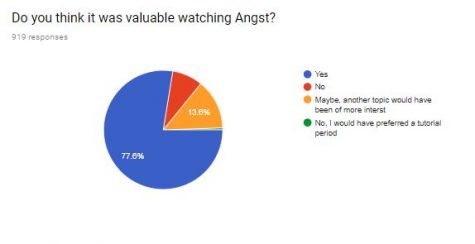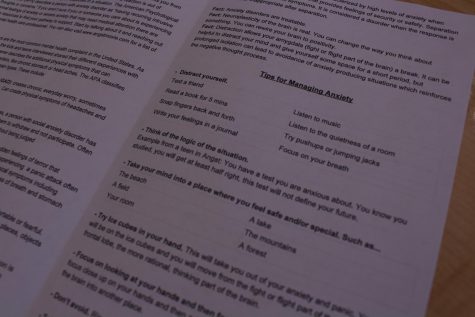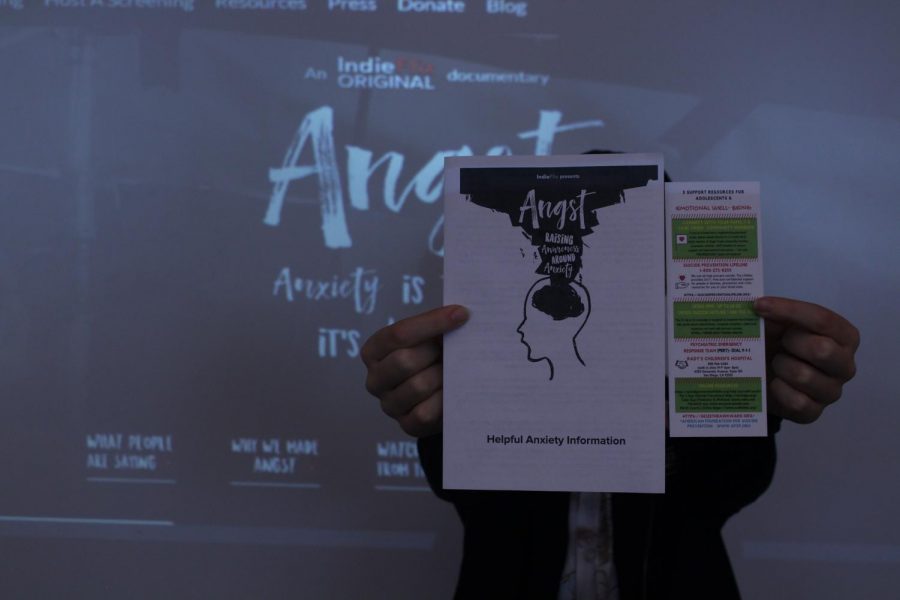Angst Opens Discussion of Mental Health On Campus
“Angst” is a documentary covering anxiety in high school students and was broadcasted in every advisory class this past Wednesday. With the film being shown, students were given complimentary pamphlets covering the main topics that were discussed throughout the video.
One out of every 13 teens struggles with anxiety. This translates to approximately 104 students at Sage Creek. Two people in every classroom.
Even with as many as 104 people struggling with it at school, students are unsure about who could possibly be affected. Anxiety is something that is not commonly talked about during break or lunch and, even if it were to be, the topic is something that is hard to tread in lightly.
On Wednesday, the SCHS counseling and admin team took steps to begin a campuswide conversation about anxiety in high school students. How? Through a film. The film was shown in advisory and also in the evening to a sold-out audience in the PAC. After the evening showing, a discussion panel was held featuring local mental health professionals.
“Angst” is an independent documentary that was shown to every advisory class on Wednesday. The film talks about different forms of anxiety and how to combat the symptoms.
The topic may be hard to discuss, but it is something that still needs to be brought up. Megan Corazza is part of the counseling team that worked to bring the “Angst” showing to Sage Creek.
Corazza hopes to help students feel that they “are not alone.”
A goal that the counseling team has is to destigmatize the mental health conversations on campus and keep the subject from being closed off. They wish to normalize the topic to help students connect better with those around them.
AP Psychology teacher Allison Williams, who has experienced depression throughout her life, can speak from experience. Her AP Psych class goes over the topic of mental health during the year.
“Instead of suffering in silence about it, now there’s at least ways to talk about [mental health],” Williams said.

After the conclusion of the documentary, students were given a Google survey to fill out in regards to their experience watching the film. A large majority of students found value in watching, “Angst,” finding it to be a well spent advisory period.
The actions of administration have gone further than the documentary to destigmatize issues. In the past, the campus has seen many attempts for admin to secure a better campus culture, many of which experienced pushback. From battling microaggressions to a counter against racial slurs to a call for the end of drunk driving, students have commented on the effects it had toward the campus.
“The hope is that students reflect [on] the film and just see it as positive….I think some other presentations have not been received that way. And I just hope that students [can] connect with at least one person [in the film] because there are so many different types of students represented,” Corazza said.
Adding onto concerns of students’ reactions, Williams mentioned some of her advisory students had expressed complaints wondering ‘why’ when the documentary was announced campus-wide.
“They feel a little disconnected in their advisory class. And that just makes me nervous on how all the kids are going to handle it,” Williams said prior to the documentary being presented throughout the school.

Complimentary to the viewing experience of “Angst,” students were given a pamphlet filled with “helpful anxiety information.” One of the highlights of both the documentary and the pamphlet are diverse “tips for managing anxiety” that students can take to help with any anxiety they face themselves or the anxiety their peers deal with.
She said she wished she could have shown it in the environment of her AP Psych class where they are more like a “family.”
“I think the need for this [presentation] outweighs any uncomfortableness or maybe some kids being resistant,” Williams said.
Senior Kailiyah Hauser has also dealt with severe obsessive-compulsive disorder and has chosen mental health as the topic of her Genius Project. Her plan was to open conversation about people’s experiences through a photo documentary, but she ultimately had to change the subject of her project due to the stigma around mental health and few people being open to talking about it. Her hesitation of the film went beyond students’ reactions to the need for resources and action over awareness of mental health.
“Previously, mental health education has mostly been about raising awareness,” Hauser stated.
She along with other students feel that they already know about the topic and would like to see actions pertaining to it.
“Mostly what to do in that situation or how to seek help or seek out treatment,” Hauser said.
The documentary included techniques students could use to help calm themselves if they begin to feel anxious in school or personal situations including listening to music, snapping or journaling. All students were given an anxiety information sheet that reiterated the tips for managing anxiety.
“It can be helpful to distract your mind and give yourself some space for a short period, but prolonged isolation can lead to avoidance…which reinforces the negative thought process,” the information sheet said.

Counselor Megan Corazza visits AP Literature students the Friday after viewing the “Angst” documentary. The team is hoping that the showing of “Angst” will help lead to a school-wide conversation on topics including anxiety and stress.
Staff and classes are going beyond the documentary to educate students and help with stress and education in different ways. Corazza is beginning to speak in senior English classes as part of her outreach to help them with stress regarding college transition.
“We’re noticing some stress of seniors and it wasn’t about Angst. It was about how are they doing and so there’s actually a very natural transition process that’s occurring…for seniors planning for life after high school,” Corazza said.
The fourth (senior) year biomedical class also did a mental health unit leading up to the day of the documentary, a class which Hauser is in as well. The unit taught students about the topic and also included a guest presentation from a representative from the National Alliance on Mental Illness.
Sage Creek made many strides to make the “Angst” film presentation as impactful as possible. Going forward, Corazza hopes their resources can expand, and she tries to work with her current limited resources in order to connect with students, refer to professionals and educate the community.
“In a perfect world, we would employ more counselors, we would have maybe group counseling sessions after school. And so, of course, we will continue to aspire to those services.”



